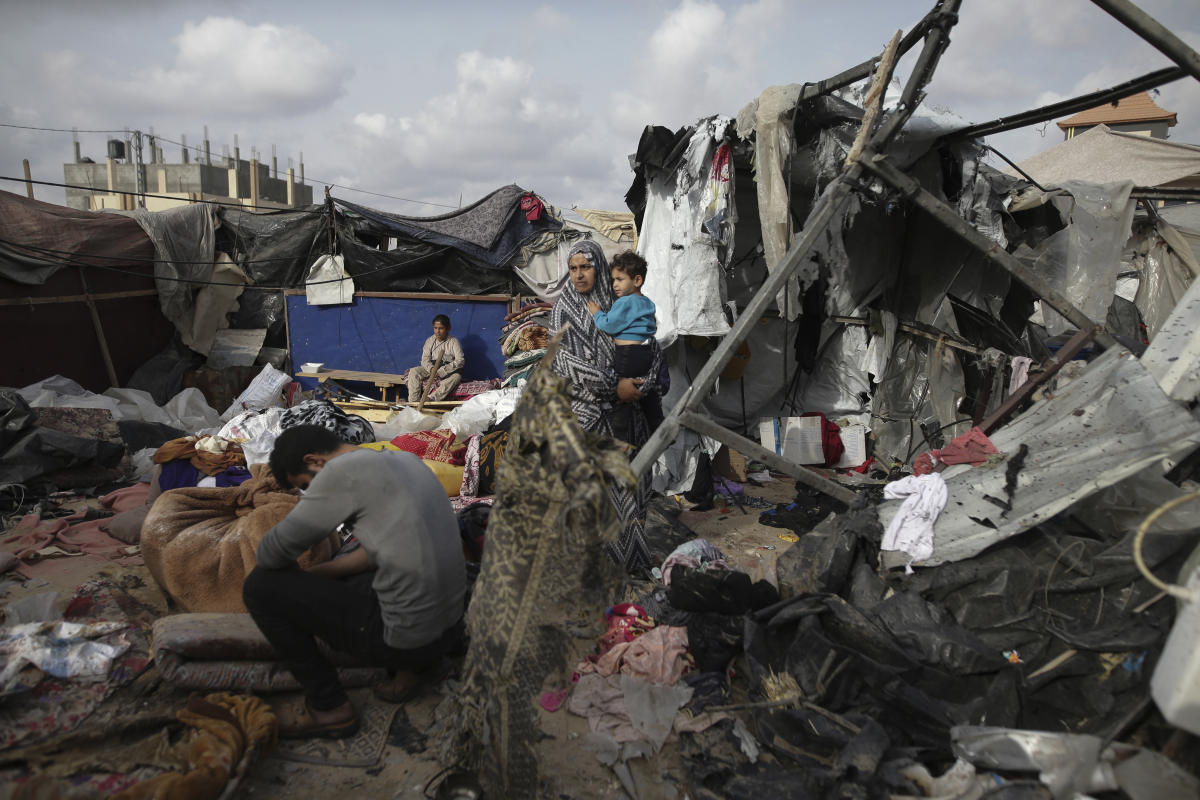WASHINGTON (AP) — Recognizing only an “uptick” in Israeli military activity, the United States has gone to great lengths to avoid any suggestion that Israeli forces have crossed a red line set by President Joe Biden in the deepening offensive in the southern city of Gaza. Rafa.
In the past week alone, Israeli attacks on displaced families sheltering in tents have drawn international condemnation and Israel confirmed its forces were operating in the city center. Still, Biden administration officials say Israel has avoided mass attacks on Rafah’s densely populated neighborhoods and kept attacks more limited and targeted than earlier in the nearly eight-month war with Hamas.
That refrain underlines an increasingly isolated position of the US.
Critics argue that Biden, who declared early last month that he would not supply offensive weapons if Israel launched an all-out assault on Rafah, has encountered a domestic red line of his own and has decided not to cross it: challenging ally Israel, which is in an election year receives the support of Republicans and many American voters.
Government officials “continue to move the goalposts when it comes to the Rafah operation and say, ‘You know what, we’re not going to let the Israelis do X, Y or Z,’” said Colin Clarke, an international security expert and research director at the Soufan Center, a research Center. “And then someone says, ‘Well, don’t they do that?'”
“So they have been playing semantics around what the Rafah operation entails,” he said. “I think if it wasn’t an election year, you would see the president being much more powerful.”
Government officials insist Israel has changed tactics in an effort to reduce civilian deaths as the army rampages through the city and targets Hamas operatives – even as humanitarian conditions worsen. About 1 million Palestinians have fled the Rafah offensive and are sheltering in squalid tent camps, and aid continues to trickle into the area. According to the United Nations, only 200,000 to 300,000 people remain.
“We have been clear about what this is not, which is not a major military operation,” State Department spokesman Vedant Patel said Thursday. He called Israeli attacks on the outskirts of the city and the seizure of an adjacent border area with Egypt an “upsurge.”
Pressed on the question, National Security Advisor Jake Sullivan told reporters that there is “no mathematical formula” to determine when or if the attack on Rafah will go beyond the terms set by the Democratic president.
The US would investigate whether the operation caused “extensive death and destruction” or was “more precise and proportionate”, Sullivan said.
Unlike earlier in Israel’s push to cripple Hamas militants in Gaza, the Israelis have transferred their specific battlefield objectives and plans to get there in the Rafah offensive, a senior government official said Friday. The official, who spoke on condition of anonymity to brief reporters on White House ground rules, said if these plans change and Israel returns to previous tactics, “that might be a different story.”
Israel began its war in Gaza after Hamas attacks on October 7 killed about 1,200 Israelis. Since then, more than 36,000 Palestinians have been killed, many of them women and children. Fighting and Israeli restrictions on aid shipments through border crossings mean that almost all of Gaza’s 2.3 million people are facing severe hunger. UN officials say famine in the north has already begun.
It was Israel’s operation against Hamas in Rafah that prompted Biden’s strongest warnings last month about Israel’s handling of the war and that the US could cut off supplies of offensive weapons. Rafah’s population had swelled to about 1.3 million as Israeli offensives in the north pushed Palestinian civilians south.
“If they invade Rafah, I will not deliver the weapons,” Biden told CNN on May 9. He referred to the red line as an attack on “population centers” in the city.
Around the same time, US officials confirmed that the administration had suspended a shipment of heavy bombs to Israel to ensure they would not be dropped on Rafah.
Republican condemnation of Biden’s action was swift and fierce. Shortly afterwards, the chief prosecutor of the world’s highest war crimes court requested an arrest warrant against Israeli Prime Minister Benjamin Netanyahu and the UN’s highest court ordered Israel to cease operations in Rafah, increasing political pressure on the US and Israel .
Brian Finucane, a former State Department official and now a senior adviser for the International Crisis Group, notes that there are “changes in tone and tenor” in the administration’s public comments toward Israel from around that time. Biden said efforts to get an arrest warrant for Netanyahu were “outrageous.”
The government’s warnings and threats to Israel over the Rafah campaign faded away. Biden, in a White House speech on Friday urging Hamas to accept an Israeli proposal for a ceasefire and the release of hostages, made only passing mention of the operation there, noting widespread images of children killed last Sunday in an Israeli attack that burned some of the 45 victims alive.
Far more important than whether the US is berating or merely repeating Israeli talking points, Finucane said, is “what the administration is actually doing in terms of policy… to bring about a shift in what is actually happening in Gaza.”
___
Associated Press writers Julia Frankel in Jerusalem and Aamer Madhani contributed to this report.
